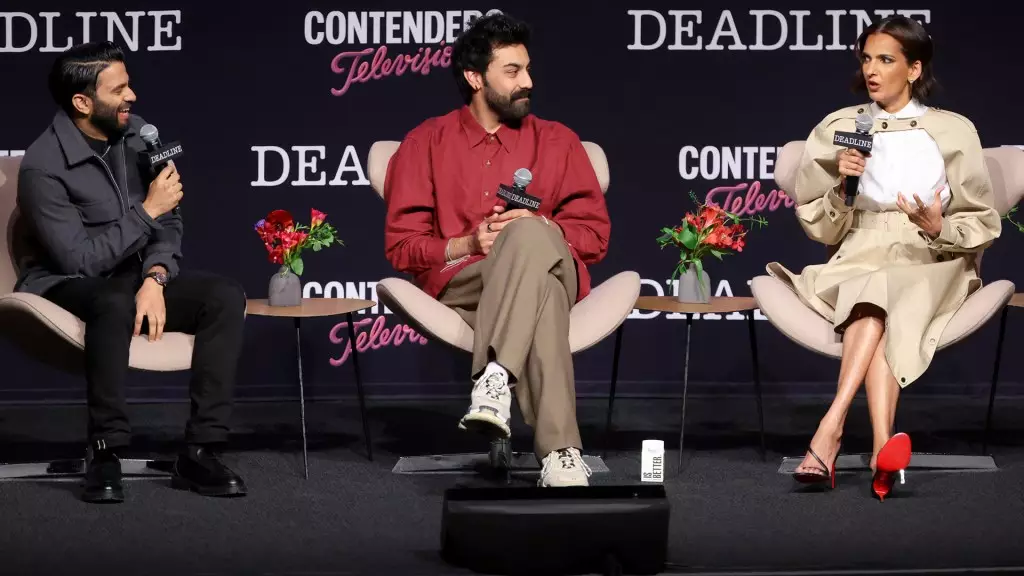In the grand tapestry of television, few roles challenge traditional gender norms like the character of Lucky Auntie, portrayed masterfully by Poorna Jagannathan in Hulu’s latest comedy series, *Deli Boys*. This audacious portrayal of a crime boss not only flips the script on typical male-driven narratives but also exemplifies the evolving landscape of female representation in media. With a unique blend of humor and grit, *Deli Boys* positions itself as a refreshing take on the crime genre, akin to what *Tony Soprano* achieved for male anti-heroes but with a refreshing female perspective.
What is fascinating about Lucky Auntie’s character is the journey of its conception. Originally drafted as a male role, the character’s transformation into a badass South Asian woman came after a transformative moment during a talk by Geena Davis. The call to action to reimagine male roles as female ones speaks volumes about the current cultural zeitgeist. How often do we witness characters that shatter the glass ceiling without pandering to stereotypes? *Deli Boys* does exactly that, offering a platform where female characters can wield power not through submissive tropes but through complex, multifaceted personalities.
Masculinity Meets Femininity
Lucky Auntie’s characterization is a brilliant study in contrasts. She embodies a unique masculine energy, reflecting a fierce independence and ruthless efficiency. Jagannathan’s portrayal demonstrates that a woman can be formidable yet still retain elements of tenderness. This duality enables the character to resonate with a broader audience: she is a hard-hitting crime boss who can simultaneously care for her family and engage in violent escapades. One could argue that this complexity makes her one of the most relatable characters on television, as it mirrors the duality many women navigate in their lives.
The character’s dynamic with her nephews reveals how traditional maternal instincts can coexist with unyielding strength. She takes on a nurturing role that doesn’t strip her of her fierce identity; rather, it enhances it. Lucky Auntie’s actions—whether it’s wiping away blood or food from her family members—embody the fierce loyalty and protectiveness typical of South Asian mothers, yet they unfold against a backdrop of chaos and violence. This nuanced approach breathes life into the concept of a ‘strong woman’ by connecting her toughness with caretaking in a way that feels authentic and refreshing.
Redefining Female Power in Media
In a landscape where crime dramas often depict women as mere afterthoughts or side characters, *Deli Boys* rises to the occasion by placing a South Asian woman front and center in a traditionally male-dominated sphere. This shift is not just a victory for representation but also serves to dismantle longstanding stereotypes that have painted women as passive or secondary. With Lucky Auntie, viewers are compelled to grapple with the complexity of her character as she takes charge of her surroundings, demonstrating that strength is multifaceted.
The importance of diverse storytelling cannot be overstated in this era. When creators choose to evolve their narratives beyond conventional boundaries, they pave the way for future storytellers to explore new avenues. Abdullah Saeed’s decision to transform Lucky Auntie from a male figure into a commanding woman not only substantiates the need for greater inclusivity in scriptwriting but also shows that the audience is ready for new, audacious tales that challenge the status quo.
Impact on Audience Perception
The ripple effects of such transformative roles are significant; they open avenues for discussions concerning gender, power, and cultural representation. Viewers consuming *Deli Boys* are not merely entertained; they witness the rising prominence of women in roles historically left to men. This evolving landscape challenges audiences to reevaluate their perceptions of female characters—moving away from simplistic depictions toward more layered, robust portrayals that upend stereotypes and broaden the scope of possibility for all women in media.
Poorna Jagannathan’s portrayal of Lucky Auntie is not just about playing a character; it’s a statement. It shouts from the rooftops that women, regardless of cultural backgrounds, can dominate the storytelling landscape, wielding both charm and menace. As we continue to progress, we eagerly look forward to more bold and unapologetic characters who dare to defy expectations and redefine what it means to be a woman on screen.

Leave a Reply